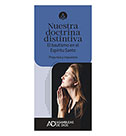AG Our Distinctive Doctrine, updated
Item: 344214
In Stock
Overview
Our Distinctive Doctrine: The Baptism in the Holy Spirit, Questions & Answers—The
Assemblies of God
You can easily and economically give your church attendees a great understanding of the baptism
in the Holy Spirit with this brochure. It’s perfect for handing out in a membership class, in a
Sunday School class on the Holy Spirit, after a sermon on the Holy Spirit, and even
individually as people receive the baptism. Even if people understand the basics, reading this
brochure at home allows them to ponder their questions and the brochure’s thorough answers.
Plus, every answer is filled with Bible references so people can easily discover more from
God’s Word.
The brochure starts at the beginning, Acts 2, and briefly describes the history of the
Pentecostal movement. Then it provides answers to 20 straightforward questions believers often
have about the baptism in the Holy Spirit.
- Do Christians receive the Holy Spirit when they are saved? If so how is the experience
different from the baptism in the Holy Spirit?
- Can a person receive eternal life in heaven without receiving the baptism in the Holy
Spirit? If so, why should we be baptized in the Spirit?
- Once a person is baptized in the Holy Spirit, why is it necessary to be refilled
later?
- What is the difference between “speaking in tongues” when one is baptized in the
Spirit and “speaking in tongues” publicly? Also what is the advantage of “praying in tongues”
in one’s prayer life?
- When tongues are exercised publicly according to the biblical standard, should there
always be an interpretation? Who should give the interpretation?
- For whose benefit and for what purpose are there utterances in tongues followed by
interpretation?
- Is it possible for an interpretation of tongues to run contrary to the teachings of
the Bible?
- As humans, do we play a role as to whether or not tongues and other gifts will operate
in the church?
- Can a person be filled with the Holy Spirit without speaking in tongues?
- In the first outpouring recorded in the New Testament, there were tongues of fire and
the sound of a violent wind. Why does that not occur today?
- Is it possible to be saved and baptized in the Holy Spirit at the same time?
- First Corinthians 13:8 says “Whether there be tongues, they shall cease.” Wouldn’t
this indicate the baptism in the Holy Spirit was only for those first followers 2,000 years
ago?
- Since Paul suggested in 1 Corinthians 14:19 that it is better to speak intelligible
words in church than to speak in tongues, doesn’t it follow that the experience of tongues is
unnecessary today?
- Is there proof the outpouring of the Holy Spirit experienced today is genuinely
biblical?
- Why do Pentecostals emphasize speaking in tongues when it is mentioned only a few
times in Acts and 1 Corinthians 12 to 14?
- Who should be baptized in the Holy Spirit?
- When people are filled with the Holy Spirit, are they in a semiconscious state, or are
they totally coherent and aware of what is happening?
- Why are some people baptized in the Spirit immediately, while others seek so long
without receiving the experience?
- When a person is seeking the baptism in the Holy Spirit, can anything be done to
prepare his life or environment that will quicken the infilling?
- Is tongues the only evidence of the infilling of the Holy Spirit? Will there be any
significant changes in one’s attitudes and actions after being baptized in the Holy Spirit?
Product Details
Format: brochure
Pages: 16
Size: 3¾ x 8½
Publisher: Gospel Publishing House
Pub. Date: August 8, 2017
Available in Spanish
Nuestra doctrina
distintiva
